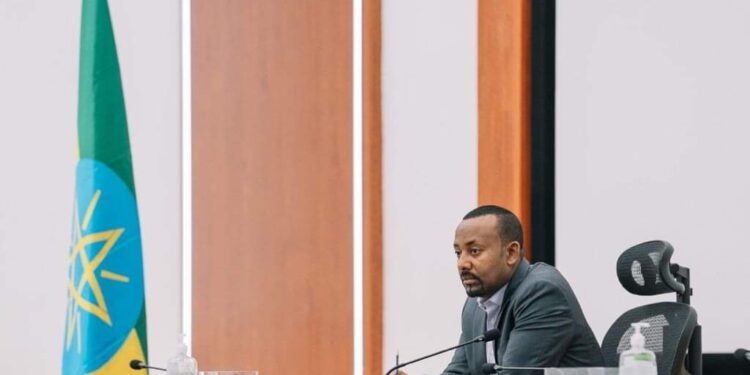By Janet Sankale
African and Western states have called for a ceasefire as the conflict in Ethiopia’s northern districts escalated, threatening to overrun the capital, engulf the rest of the country, and worsen the humanitarian situation.
Tensions continued to rise in Ethiopia, with the government declaring a state emergency as fears heightened that the rebel Tigray People’s Liberation Front (TPLF) and their new-found allies, the Oromo Liberation Army (OLA), were advancing on Addis Ababa.
United States Secretary of State Antony Blinken called for peace negotiations “without preconditions” with the aim of obtaining a ceasefire.
According to a press statement, the United States expressed deep concern about the risk of inter-communal violence aggravated by antagonistic exchanges on all sides of the conflict, especially on social media.
“Inflammatory language fuels the flames of this conflict, pushing a peaceful resolution ever further away. We are also concerned about reports of arbitrary detentions based on ethnicity in Addis Ababa,” said the statement dated November 4, 2021.
America urged all forces to lay down their arms and open dialogue to maintain the unity and integrity of the Ethiopian state. It asked the government of Ethiopia to halt its military campaign, including airstrikes in population centres in Tigray and mobilisation of ethnic militias, and the government of Eritrea to remove its troop from Ethiopia. It further called on TPLF and OLA forces to halt their advance on Addis Ababa.
“The international community stands ready to assist the Ethiopian people to end this conflict now,” the US said.
The American special envoy for the Horn of Africa, Jeffrey Feltman urged all parties to the conflict to “give peace a chance”.
“The Ethiopian government and the TPLF should immediately commence negotiating and implement a series of parallel steps that will stop the violence, allow life-saving access to Tigray, lead to TPLF withdrawal from Afar and Amhara and Eritrean forces from Ethiopian territory, result in a durable ceasefire (with rules understood and perhaps with third-party monitors), and initiate accountability for human rights abuses and any war crimes,” he added.
The US embassy in Ethiopia, in a post on its website, announced that it had authorised the voluntary departure of non-emergency government staff and family members because of the escalating conflict.
Moussa Faki, the chairperson of the African Union Commission (AUC), called on all the parties involved to embrace dialogue to safeguard the territorial integrity, unity, and national sovereignty of the Federal Republic of Ethiopia.
Addis Ababa, Ethiopia, is the seat of the AUC, the African Union’s secretariat, which manages the day-to-day activities of the union.
The European Union (EU) and the Intergovernmental Authority on Development (IGAD) also called for a ceasefire.
IGAD urged both sides to show restraint, cool tensions, and work out their differences through discussion.
The US, the EU, and the UN called for an end to a de facto government blockade in Tigray to avert a large-scale famine.
Kenya’s President Uhuru Kenyatta, the president of the UN Security Council in October 2021, appealed to Ethiopia to end to the year-long conflict and start talks with its opponents as a prelude to finding a path to sustainable peace.
Kenya has increased its security along its borders with Ethiopia as many Ethiopians flee.
Ugandan President Yoweri Museveni called for a meeting of eastern Africa leaders on November 16 to discuss the conflict.
On November 3, 2021, the Office of the United Nations High Commissioner for Human Rights released a report on the devastating impact the conflict has had on civilians.
The report, a joint investigation by the Ethiopian Human Rights Commission and the UN Human Rights Office, found that there are reasonable grounds to believe that all parties to the conflict in Tigray have, to varying degrees, committed violations of international human rights, and humanitarian and refugee law, some of which may amount to war crimes and crimes against humanity.
While declaring the six-month state of emergency on November 2, 2021, Prime Minister Abiy Ahmed asked Ethiopians to defend the capital Addis Ababa against Tigrayan forces.
He explained that the state of emergency aimed to protect civilians from “atrocities being committed by the terrorist TPLF group in several parts of the country”, Fana Broadcasting Corporate reported.
UN Secretary-General António Guterres reiterated his call for cessation of hostilities, unrestricted humanitarian access to deliver urgent life-saving assistance, and inclusive national dialogue “to resolve this crisis and create the foundation for peace and stability throughout the country”. He offered to help create the dialogue.
Abiy won the Nobel Peace Prize in October 2019 for ending a 20-year border conflict with Eritrea. However, the current fighting in his country has battered his international reputation, especially in the wake of reports of human rights violations and famine.
The TPLF had dominated the national politics for over 30 years but lost influence when Abiy took power in 2018. The war in Ethiopia began on November 3, 2020, when forces loyal to the TPLF, including some soldiers from the federal government, seized military bases in Tigray. In response, Abiy sent troops.
According to reports, the conflict has so far killed thousands of people, more than two million have been displaced from their homes, and 400,000 in Tigray alone are facing famine.
According to the UN, humanitarian groups are still being prevented from delivering critical aid even as a total of 900,000 are threatened by famine.







